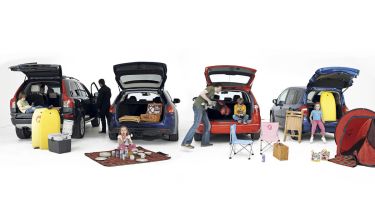Volvo XC90 vs rivals
As drivers look to cut their bills, downsizing appears tempting. But does it make sense? We see how feasible three steps into lower-cost motoring really are...

SKY-high fuel prices, spiralling maintenance bills and a proposed road tax hike mean motorists are feeling the pinch. Whether you drive a thirsty 4x4 or a small family car, the chances are you’re paying more than ever to get around.
So, is there anything you can do to relieve the strain on your wallet? The answer could be to buy something smaller. Downsizing is a growing trend in the car market – and it’s easy to see why. Big vehicles come with big running costs, and scaling down is an easy way to slash your bills.
But do the savings outweigh the compromises? We’ve lined up four models to see the sacrifices each step down the motoring ladder demands from our starting point of a Volvo XC90 – and on Page 50, we decide if the trade down is worth making. With each car competing in a different class, you won’t find a conventional verdict. Instead, we see how low you can go before losing out too much on versatility and desirability – no matter what the saving.
To qualify for inclusion here, the models need to be efficient both in terms of the amount of fuel they use and the tax costs they incur – the cars in our quartet are designed to save you money over the next model in the ladder. With four-wheel drive and seven seats, the XC90 is one of the most versatile family buys. But the Swedish SUV’s flexibility doesn’t come cheap, so a large estate is the next logical downward step.
As the previous Honda Accord Tourer was one of the most practical cars money could buy, we’ve picked the all-new model to represent the second rung on the ladder. Another step down in running costs is the fresh-faced Hyundai i30 Estate. It has lots of space and a low price; the question is whether it’s good enough to justify downsizing.
Finally, the Renault Grand Modus is one of the latest generation of roomy supermini-MPVs. Can it swallow enough family clutter to be a contender? Read on as all is revealed.
Verdict
WITH four-wheel drive, a flexible seven-seat cabin and a desirable badge, the Volvo has a breadth of abilities unmatched in this test. But they come at a price… and costs are rising all the time.
What’s more, the XC90 is now showing its age, especially when lined up next to the new Honda. The Accord won the catwalk battle with ease, and its excellent diesel engine and rewarding dynamics make trading down from the Volvo tempting – as long as you don’t need the SUV’s extra seats.
More impressive is the fact you save £6,292 over three years by choosing the Hyundai. It can’t carry as much as the Accord and has only a fraction of its desirability, but is fine family transport and doesn’t disappoint from behind the wheel.
A lesser version of the Honda might fare differently, but we’d recommend downsizing to the i30.
Changing to a Grand Modus calls for more sacrifices in practicality. And when you’re not making a big cost saving, the Renault’s mediocre dynamics are unlikely to tempt buyers away from the Hyundai.







